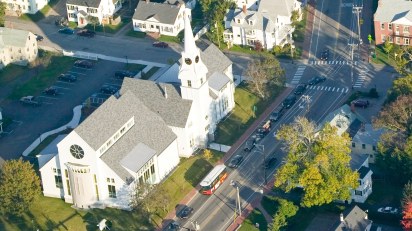Key point 6-03.5. The Church Audit Procedures Act provides churches with several important protections in the event of an Internal Revenue Service (IRS) inquiry or examination.
However, there are some exceptions.
Background
A federal appeals court ruled that the protections of the Church Audit Procedures Act do not apply to third-party summons issued to a church’s bank in pursuit of church banking records.
Under IRC Section 7611 the IRS may only initiate a church tax inquiry if an appropriate high-level Treasury Department official believes, based on written evidence, that the church:
- (a) may not qualify for the exemption, or
- (b) may not be paying tax on an unrelated business or other taxable activity.
Restrictions on church inquiries and examinations apply only to churches (including organizations claiming to be churches if such status has not been recognized by the IRS) and conventions or associations of churches.
They don’t apply to related persons or organizations.
For example, the rules don’t apply to schools that, although operated by a church, are organized as separate legal entities.
Similarly, the rules don’t apply to integrated auxiliaries of a church.
Restrictions on church inquiries and examinations do not apply to all church tax inquiries by the IRS. The most common exception relates to routine requests for information, such as return filing, compliance with certain tax withholding requirements, and supplemental information needed to process returns and applications.
Restrictions on church inquiries and examinations don’t apply to criminal investigations, either.
They also do not apply to investigations of the tax liability of any person connected with the church, such as a contributor or minister.
Audit Process
The audit process goes like this:
1. If an appropriate high-level Treasury Department official believes, based on written evidence, that the church (a) may not qualify for the exemption, or (b) may not be paying tax on an unrelated business or other taxable activity, the church can respond in writing to those concerns.
2. If the church does not respond, or if the response does not remove the concerns, the IRS may inform the church of the need to examine its books and records. This is usually communicated within 90 days. It is known as the second notice. The second notice will contain a copy of all documents collected or prepared by the IRS for use in the examination.
3. The church can ask the IRS for a conference to discuss the concerns before its books and records are examined.
4. Generally, examination of a church’s books and records must be completed within two years from the date of the second notice from the IRS. If at any time during the inquiry process the church supplies information that alleviates the IRS’s concerns, the matter will be closed without examination of the church’s books and records. There are additional safeguards for the protection of churches under tax code Section 7611.
God’s Storehouse Church v. United States
God’s Storehouse Church (“GSH”) was founded in 2009 and incorporated in 2010 as a Kansas not-for-profit corporation.
GSH did not apply to the IRS for recognition of tax-exempt status. Instead, it declared itself a “church” pursuant to section 508(c)(1)(A) of the Internal Revenue Code.
GSH operates a thrift store with a coffee shop. GSH’s thrift store sells donated items to the public. The coffee shop sells coffee to the thrift store’s patrons at cost.
GSH paid gross wages to the pastor and his wife in 2019 and 2020.
GSH’s tax forms demonstrate that, during that two-year period, it withheld employment taxes from the wages of other employees, but did not withhold any taxes from the gross wages of the pastor and his wife.
In November 2020, the pastor was elected to the Kansas Senate.
During his run, his campaign purchased yard signs that included the words “Founder of God’s Storehouse” below his name.
The Kansas Governmental Ethics Commission vetted and preapproved those signs.
According to the pastor, GSH did not “create, purchase, display, distribute, or in any way contribute to any yard signs associated with” his campaign, and did not “intervene in or support [his] campaign for Kansas Senate.”
IRS launches investigation
In February 2021, the IRS decided to investigate whether it should initiate a church tax inquiry into GSH for the 2019 and 2020 tax years.
That June, IRS issued a Notice of Church Tax Inquiry (“Inquiry Notice”) to GSH after the investigating agent secured approval from the IRS Commissioner of Exempt Organizations.
The notice listed four concerns:
- GSH potentially operated as a thrift store instead of a church,
- GSH may have improperly intervened in a political campaign,
- GSH’s coffee shop may incur liability for unrelated business income tax, and
- GSH’s wage payments to the pastor and his wife may incur liability for unpaid employment taxes.
The IRS summoned GSH’s bank to provide various records pertaining to GSH’s accounts to assist with addressing the four concerns.
GSH pushes back
GSH claimed the summons was invalid because the Tax Exempt and Government Entities Commissioner (“TE/GE Commissioner”), the IRS official that signed off on the GSH inquiry, is not an “appropriate high-level Treasury official” for purposes of church inquiries and examinations.
The district court denied GSH’s petition, concluding (1) the tax code protections pertaining to church tax inquiries and examinations do not apply to third-party summonses; and (2), even if these protections did apply to third-party summonses, the IRS complied with them.
GSH appealed to a federal appeals court. The appeals court concluded that the tax code “makes clear it does not apply to third-party summonses. Accordingly, it is unnecessary to decide whether the TE/GE Commissioner is an appropriate high-level Treasury official.”
The court added:
the problem for GSH is that the plain language of [the tax code] makes clear that a third-party summons cannot be a church tax inquiry because it is not an inquiry directed to a church. . . . The IRS’s summons . . . sought the bank’s records, not GSH’s records. In any event [section 7611(h)(4)(B)(i)] of the tax code] makes clear that records obtained pursuant to a . . . third party summons are not included within the definition of church records.
The court concluded that, as with any statute,
… tax code provisions pertaining to examinations of church finances reflect a legislative balance—here, between allowing [the IRS] to effectively perform its statutorily mandated investigative duties, while providing heightened protections to churches in light of their unique social and constitutional status. As the plain text of the tax code makes clear, Congress struck this balance by placing certain restrictions on [the IRS’s] ability to make an inquiry to a church and examine the church’s records and religious activities, while specifically exempting from those restrictions summonses made to third-party recordkeepers . . . . [The] argument that this arrangement allows [IRS] to essentially bypass . . . safeguards afforded to churches under section 7611 is one to be taken up in the halls of Congress, not a courtroom.
Why this case matters to churches
First, it contains a helpful review of the “audit process” followed by the IRS in church tax inquiries and examinations (formerly referred to generally as “audits.”)
Second, contrary to the assumption of many church leaders, the tax code protections for churches in responding to tax inquiries and examinations do not apply to a church’s accounts and other documents in the possession of a bank or other financial institution.
Third, the court noted that the church claimed that the basis for its exemption from tax was not section 501(c)(3) of the tax code, but rather section 508(c)(1)(A).
While the court mentioned the church’s alleged basis under 508(c)(1)(A) for its exempt status, it did not address it further since doing so was not necessary to its ruling.
The danger of pursuing 508(c)(1)(A) status
Some church tax “experts” are claiming that churches can avoid any taxes, regulation, or liability by reclassifying themselves as “section 508(c)(1)(A)” churches.
This is a flawed interpretation of federal tax law.
The fact is, churches meeting basic criteria are automatically 501(c)(3) organizations. There is nothing they need to do to acquire this status. Therefore, it is not clear how they could renounce their 501(c)(3) status. A church theoretically could become a for-profit entity, but this would have serious consequences, including the loss of any charitable contribution deduction for donations made by church members to the church.
Clearly, any activity that jeopardizes a church’s exemption from federal income taxation is something that must be taken seriously.
Churches should not pursue the dubious “section 508(c)(1)(A)” church status, which one federal court labeled “frivolous,” without the counsel of an experienced tax attorney or CPA.
To be sure, the tax code contains a section ”508(c)(1)(A),” but it has nothing to do with the exemption of churches. Rather, it exempts churches and certain other religious bodies from the necessity of applying for recognition of their exempt status under section 501(c)(3).
As one court in a California case several years ago noted, “Nothing in [the tax code] suggests that a bank’s financial records concerning the financial activity of a religious organization are exempt from investigation.”
The court concluded:
The IRS has broad investigative authority, including the authority to examine records or witnesses in order to determine whether tax liability exists or to make a return where none has been made. In short, [the ministry’s] arguments have no basis in law, and are frivolous.
God’s Storehouse v. United States (10th Cir. 2024).

